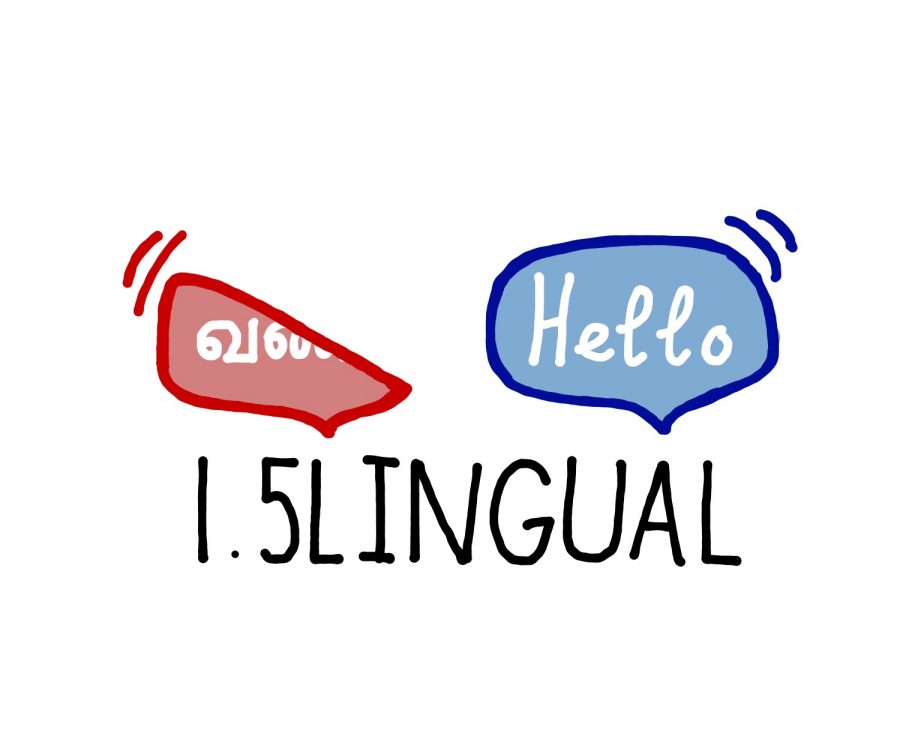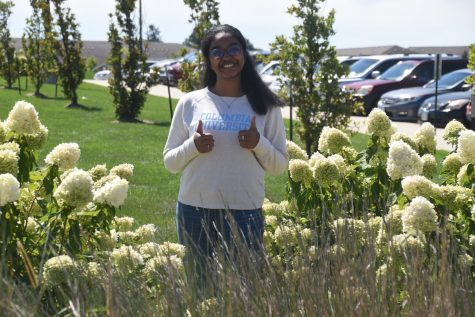Not Quite Bilingual
1.5 speech bubbles in two different languages.
April 12, 2019
I was born in India. I grew up with a cacophony of noise surrounding me; from the noise of pots and pans clanging when my mother cooked to the boisterous shouts of my brother and cousin when they ran around the house to the audible thrum of the city of Chennai itself. Among all those noises, the most important emerged: the sounds of my mother tongue, Tamil.
In India, countless languages are spoken. The Indian Constitution gives recognition and status to 22 official languages. (In comparison, the United States has no official language.) Tamil, the language I grew up hearing, is among the most spoken in India.
Growing up with both English and Tamil in my home was the greatest blessing in disguise. Knowing two languages has a lot of advantages. I can speak a different language and the majority of those around me will have no idea what I am saying (which is particularly helpful in public places). Once, in the middle of a tennis match, I turned to my partner, who also knows Tamil, and talked strategy without the other team understanding a word. We won that match, although I’d like to think it had more to do with our ability to play tennis rather than the language spoken at the time. Saying that I know another language is also really helpful during that time of year when teachers and students want to know fun facts about everyone. (Being asked immediately afterwards to “say something in Indian” is a little less fun, though.) There are perks to having knowledge of two languages.
But what happens when that second language starts to get lost in an Americanized world full of English? At times, it feels like the longer I live in the United States, the more distanced I am from my cultural roots. I’ve started to forget Tamil words and phrases that should be second nature to me. My bilingual life is slowly regressing into a 1.5-lingual life.
That’s problematic. For one, it’s embarrassing when I can’t understand everything an Indian aunty (older women are called “aunties” by those younger than them in India) is saying to me and I have to ask them to repeat it, which just results in the conversation reverting back to English to ensure that I can understand what is being said. But more importantly, losing knowledge of my mother tongue reflects a dilution of my culture.
I don’t claim to know everything, but I know more than enough about my culture to want to sustain it and pass it onto future generations. I believe that maintaining one’s culture is vital, and that one of the most prominent ways of doing so is holding on to the essence of the culture, the basis of what makes up a unique group of people: the language. It’s easy to slip into an “American” mold when surrounded by others who almost exclusively speak English in common spaces. Pushing past that barrier is necessary to overcome regression.
As I grow older, I want to continue to hear the accented inflections of numerous Indian languages. I want to understand the intentionality behind every syllable. I want the entirely unique sounds of Tamil to exist around me.
Tamil has been a secure presence to me that has contributed so much to enriching my life. I, above all, want to understand and reciprocate how much the language has done for me by continuing to learn and spread it. A 1.5-lingual life is not a path I’m willing to continue on.





